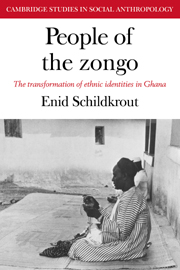Book contents
- Frontmatter
- Contents
- List of tables, figures, and maps
- Preface
- Glossary
- I Ethnicity and migration
- II Kinship and community
- III Politics and change
- 8 The political history of the zongo community: 1900–1970
- 9 The social organization of the Mossi community
- 10 Ethnicity, generational cleavages, and the political process
- 11 Conclusion: ethnicity, cultural integration, and social stratification
- Notes
- Bibliography
- Index
8 - The political history of the zongo community: 1900–1970
Published online by Cambridge University Press: 29 October 2009
- Frontmatter
- Contents
- List of tables, figures, and maps
- Preface
- Glossary
- I Ethnicity and migration
- II Kinship and community
- III Politics and change
- 8 The political history of the zongo community: 1900–1970
- 9 The social organization of the Mossi community
- 10 Ethnicity, generational cleavages, and the political process
- 11 Conclusion: ethnicity, cultural integration, and social stratification
- Notes
- Bibliography
- Index
Summary
Although there was a precolonial settlement of Muslim strangers in Kumasi, now incorporated into Asante society and known as the Asante Nkramo, the present zongo community dates back only to the beginning of the colonial period. The development of the zongo community was made possible by the British government's encouragement of the settlement of strangers. Consequently, the growth of the zongo political system must be considered in the context of the development of colonial administration in Kumasi and in Asante, as a whole. Changes in administrative policy, even when these did not refer specifically to the zongo, affected internal political development there. For this reason, it is impossible to discuss politics in the zongo, or in the Mossi community itself, in terms of either the development of political structures, or in terms of specific events, without referring to an external system. For the purposes of this chapter, “external system” refers to all personnel, policies, and actions which form part of or emanate from the larger political system in which the zongo exists. This includes the traditional and modified political system of Asante and the colonial and postcolonial governments on local, regional, and national levels. Political parties, as organizations which affect a wider community than the zongo alone, are also part of the external system. Obviously, the external system is defined from the vantage point of the zongo.
- Type
- Chapter
- Information
- People of the ZongoThe Transformation of Ethnic Identities in Ghana, pp. 193 - 220Publisher: Cambridge University PressPrint publication year: 1978



